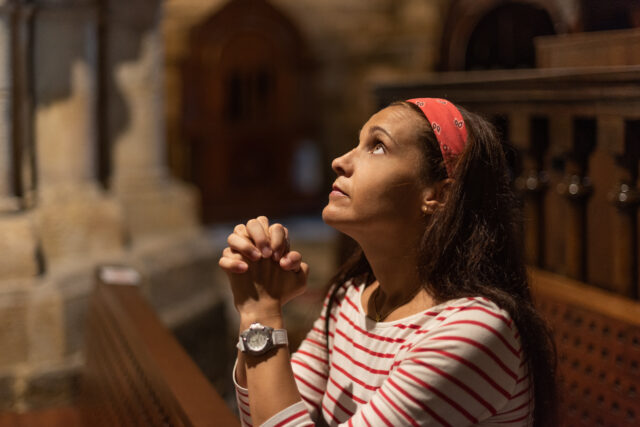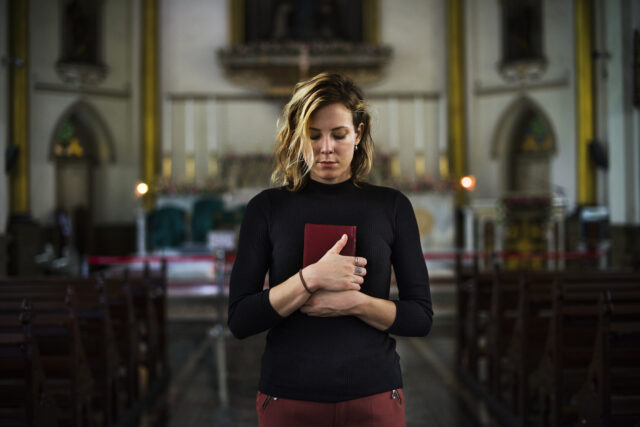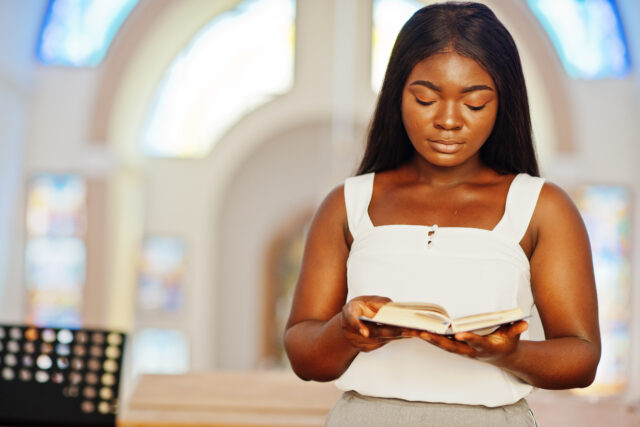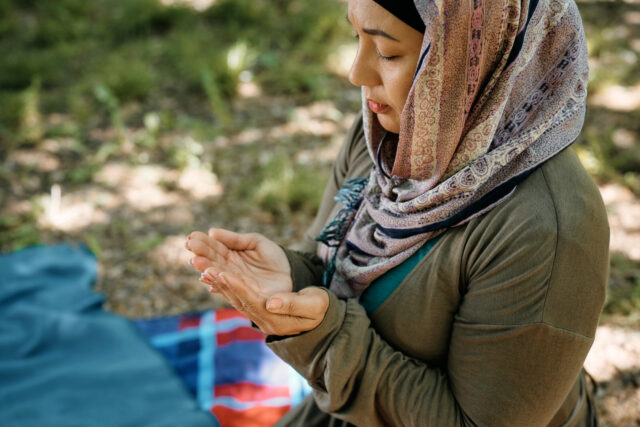Marriage is a huge decision — picking the person you want to spend the rest of your life with isn’t something to take lightly.

If you’re someone whose religious faith plays a big role in your life, you’ll likely want to marry someone who shares in your beliefs. However, you can’t choose who you fall in love with, and it’s always possible you could fall for an agnostic — or worse, an atheist. (Gasp!) Can it work? Sure, maybe — but it could also lead to some serious consequences.
1. Having different values and priorities can lead to a lot of drama.

Religion often shapes our values and priorities. When two people have vastly different beliefs, it can lead to clashes in how they approach parenting, finances, and even leisure activities. For example, a believer might prioritise attending church services and religious holidays, while a non-believer might not see the value in those traditions. These differing priorities can create tension and disagreements, especially when it comes to raising children or making major life decisions.
2. Spiritual intimacy might be lacking.

Sharing a spiritual connection with your spouse can be a source of comfort, strength, and deeper understanding. When one partner is a believer whereas the other is not, this level of intimacy might be missing. Praying together, discussing religious texts, or seeking guidance from a higher power might not be possible or meaningful for both partners. This lack of spiritual connection can leave a void in the relationship, especially for the believing partner.
3. Religious practices can become a source of contention.

Religious practices, such as prayer, fasting, or dietary restrictions, can be important aspects of a believer’s life. However, these practices might not be understood or respected by a non-believing spouse. This can lead to disagreements and resentment, as the believer might feel their religious needs are not being acknowledged or accommodated. The non-believer, on the other hand, might feel pressured or judged for not participating in these practices.
4. Raising children in a mixed-faith household can be challenging.

One of the most significant challenges of marrying a non-believer is deciding how to raise children in a mixed-faith household. Which religion, if any, will the children be raised in? Will they attend religious services? How will religious holidays be celebrated? These questions can be difficult to answer and can lead to conflict and confusion for the children as they grow up. Finding a compromise that respects both parents’ beliefs and allows the children to explore their own spirituality can be a delicate balancing act.
5. You might face judgment or disapproval from your religious community.

Many religious communities have strong views on marrying within the faith. Marrying a non-believer can lead to judgment, disapproval, or even ostracism from your religious community. This can be especially difficult if your faith is a central part of your life, and you rely on your community for support and belonging. It’s important to consider how this potential isolation might affect you and your relationship with your spouse.
6. Your non-believing spouse might not understand or respect your faith.

A lack of understanding or respect for your religious beliefs can be hurtful and isolating. Your spouse might not understand the importance you place on prayer, religious rituals, or certain moral principles. This lack of understanding can lead to misunderstandings, disagreements, and a feeling of disconnect in the relationship. It’s crucial to have open and honest conversations about your faith and its significance in your life to foster mutual respect and understanding.
7. Your spouse might not support your religious activities.

Attending religious services, volunteering for your faith community, or participating in religious retreats can be important aspects of your life. However, a non-believing spouse might not be interested in supporting or participating in these activities. This lack of support can make it difficult to maintain your religious commitments and can lead to feelings of isolation or resentment.
8. You might feel pressure to compromise your religious beliefs.

In a mixed-faith marriage, you might feel pressure to compromise your religious beliefs to avoid conflict or please your spouse. This can lead to internal conflict and a sense of betraying your own values. It’s important to remember that your faith is a personal choice, and you shouldn’t feel obligated to sacrifice it for the sake of your relationship. Open communication and mutual respect are key to navigating these differences and finding a compromise that works for both partners.
9. You might experience a sense of loneliness or isolation.
 Source: Unsplash
Source: Unsplash Even with a loving and supportive spouse, marrying someone who doesn’t share your faith can lead to feelings of loneliness or isolation. You might feel like you can’t fully share your spiritual experiences, doubts, or concerns with your partner. This can create a sense of distance in the relationship, as you might feel like a part of you is not fully understood or appreciated by your spouse.
10. You might have to make difficult decisions about the future of your faith.
 Source: Unsplash
Source: Unsplash As your relationship progresses and life circumstances change, you might face difficult decisions regarding your faith. Will you continue to practice your religion as you always have, even if it means facing opposition or lack of support from your spouse? Will you compromise your beliefs to appease your partner? Will you try to convert your spouse, or will you accept their lack of faith? These are complex questions that require careful consideration and open communication with your partner.
11. You might feel pressure to convert to your spouse’s beliefs (or lack thereof).

In some cases, a non-believing spouse might subtly or overtly pressure you to abandon your faith or adopt their world view. This can create a sense of unease and compromise your sense of self. It’s important to establish clear boundaries and communicate your unwavering commitment to your faith. A healthy relationship respects individual beliefs and doesn’t demand conformity.
12. You might experience conflict during religious holidays and celebrations.
 Source: Unsplash
Source: Unsplash Religious holidays and celebrations can be a major point of contention in mixed-faith marriages. The believing spouse might feel obligated to attend religious services or participate in family traditions, while the non-believing spouse might not share the same enthusiasm or understanding. Finding ways to compromise and create new traditions that respect both partners’ beliefs can help alleviate some of this tension.
13. You might struggle to find common ground on moral issues.
 Source: Pexels
Source: Pexels Religion often informs our moral compass. When a believer and non-believer have differing views on issues such as abortion, premarital sex, or homosexuality, it can lead to heated debates and disagreements. These moral differences can be difficult to reconcile and might require a willingness to agree to disagree on certain issues.
14. Your in-laws might not accept your relationship.
 Source: Unsplash
Source: Unsplash In some families, marrying outside of your faith can be met with disapproval or rejection. Your in-laws might not accept your spouse or your relationship, leading to strained family dynamics and potential isolation. It’s important to communicate openly with your partner about your family’s potential reaction and prepare for any challenges that might arise.
15. You might face challenges in finding a supportive community.

Mixed-faith couples might find it difficult to find a community that truly understands and supports their unique situation. They might not feel fully accepted in either religious or secular circles, leaving them feeling isolated and unsupported. Seeking other mixed-faith couples or joining online communities can offer a sense of belonging and provide valuable resources for navigating the challenges of a mixed-faith marriage.
16. Your relationship might lack a shared sense of purpose.

For many believers, faith provides a sense of purpose and meaning in life. When one partner lacks that religious foundation, it can create a disconnect in terms of shared goals and aspirations. The believing partner might feel a calling to serve their community or pursue a certain path, while the non-believing partner might not share those same priorities. Open communication and a willingness to compromise are essential to finding common ground and creating a shared sense of purpose in the relationship.
17. You might face doubts or insecurities about the future of your relationship.

The challenges of a mixed-faith marriage can sometimes lead to doubts or insecurities about the long-term viability of the relationship. You might worry about how your differing beliefs will affect your future, especially when it comes to raising children or facing life’s challenges. Open and honest communication, along with a willingness to seek guidance from counsellors or religious leaders, can help address these concerns and build a stronger foundation for the future.
18. You might have to make sacrifices for the sake of your relationship.

In any marriage, compromise is necessary. However, in a mixed-faith marriage, the sacrifices might feel more significant. You might have to give up certain religious practices, traditions, or even your dreams of raising your children in a particular faith. These sacrifices can be painful and require a deep level of understanding and commitment from both partners.
19. You might have to redefine what it means to be a spiritual couple.

In a mixed-faith marriage, traditional notions of spirituality might need to be redefined. Instead of focusing on shared religious practices, you might need to find new ways to connect on a spiritual level. This could involve exploring each other’s beliefs with an open mind, engaging in activities that promote mindfulness and self-reflection, or simply creating a shared space for love, compassion, and mutual respect.
20. You might find unexpected strength and resilience in your relationship.

While the challenges of a mixed-faith marriage are real, they can also be opportunities for growth and transformation. Navigating these differences can strengthen your communication skills, deepen your understanding of each other’s beliefs, and foster a greater appreciation for diversity. Many mixed-faith couples find that their love and commitment are strengthened by the challenges they overcome together, leading to a more resilient and fulfilling relationship.




